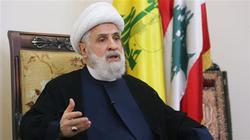 A high-ranking official of the Lebanese Hezbollah resistance movement says the cash-strapped country can no longer accept wasting time for the government formation, as economic pressures mount and mass protests demanding departure of the ruling elite continue.
A high-ranking official of the Lebanese Hezbollah resistance movement says the cash-strapped country can no longer accept wasting time for the government formation, as economic pressures mount and mass protests demanding departure of the ruling elite continue. RNA - “The government formation crisis in Lebanon has become more … harmful to people on financial, social and economic levels. Every single day that the power vacuum drags on, the situation gets worse and tougher. It is no longer acceptable to bet on the game of time and pressure in order to form a government,” Hezbollah Deputy Secretary General Sheikh Naim Qassem said on Thursday.
He added, “The available solutions are well-known, limited and not open; so it is imperative to resolve the issue, and decide on the figure who will head the new government. It is no more acceptable to waste time as it inflicts more harm on people and the economic situation.”
“People’s demands are legitimate, and we (Hezbollah) are part of the people. We regard the right of assembly in squares and demonstrations to pressure government officials as legitimate, and stress that it must be protected. But how does it lead to injuries and deaths?” Sheikh Qassem commented.
“Roadblocks amount to aggression and crime,” Sheikh Qassem said, calling on the Lebanese army and security forces to take full responsibility in securing the safety of roads for all people.
Caretaker Prime Minister Sa’ad al-Hariri announced on Tuesday that he will not be heading the country’s next government.
On October 29, Hariri submitted his resignation to President Michel Aoun.
Under the constitution, Hariri’s cabinet would stay on in a caretaker capacity until a new government is formed.
The protests began on October 17, when the government proposed imposing a tax on Whatsapp calls, along with other austerity measures.
Protesters in Lebanon have stopped blocking roads and setting up barricades, and instead shifted to holding sit-ins at state-affiliated sites.
According to Press TV, they say they will maintain pressure on the political establishment until their demands for the departure of the ruling elite and an end to chronic economic mismanagement and corruption are met.
Growth in Lebanon has plummeted in the wake of endless political deadlocks and an economic crisis in recent years.
The country hosts 1.5 million Syrian refugees, and their presence is often blamed for putting pressure on the already struggling economy.
Unemployment stands at more than 20 percent, according to official figures.
The Lebanese Finance Ministry says the national debt is hovering around $85 billion, which accounts for more than 150 percent of Gross Domestic Product (GDP).
Successive governments have failed to address a waste management crisis or improve the electricity grid, which is plagued by daily power cuts.
847/940